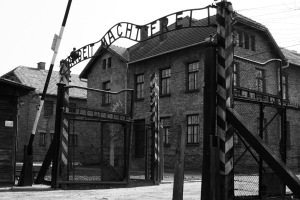This story was inspired by a first line prompt and International Holocaust Remembrance Day, which this year marks the 70th anniversary of the liberation of Auschwitz. It is dedicated to remembering.
Auschwitz Gate photo by Chris Brown courtesy of Creative Commons and flickr
The door opened and chaos ensued.
Bright lights pierced the pre-dawn darkness, and a terrible stench filled the air. Silent men in loose striped clothing climbed into the train and helped separate people from their belongings, then proceeded to help the crowded passengers out of the cars.
Shouts of “Schnell! Schnell!” permeated the air, punctuated by the snarling of dogs, straining at their leash.
Libu looked around, hugging her 5-year-old brother Nussi to her, confused. “Where are we?” she asked.
“Hell,” someone muttered.
Her mother offered her a smile which was more an upward lift of her lips in odd contrast to her melancholy eyes. She shifted the baby in her arms to her left side, and reached for Nussi. “Look, Libu, see the sign?”
Libu followed her mother’s glance. “Arbeit macht Frei.” The German was close enough to the Yiddish she spoke. Work liberates.
“See,” her mother reassured her, “it’s a work camp. You’re a big girl now, you’ll be fine.”
Libu didn’t feel so big. “I’m only fourteen, Mamme,” she protested.
“Here you’ll be whatever you have to be,” her mother answered softly.
“Sixteen,” murmured one of the striped-clad men, so silently she wasn’t even sure he’d spoken.
Libu nodded reluctantly. Before she realized what was happening, they were formed into lines, five abreast. She looked about, and in a panic realized she couldn’t see her mother or father, or any of her siblings. “Mamme, Tatteh!” she called.
“Shhh, liebling,‘ a familiar voice whispered.
Libu looked up, relieved to see her aunt’s young sister-in-law, Suri, married just a month before. Her eyes reflected eons of sadness, but she gripped Libu’s hand tightly and Libu’s drumming heart calmed, just a little.
The projectors lit up the stark scene turning the dark into light adding to the confusion of night and day. They were hustled along, and suddenly a man was eying them as they walked, a riding crop in his hand, although Libu couldn’t see any horses.
“Links, rechts.” Sometimes he spoke, sometimes he merely motioned, and the group was separated to the left and the right into two new lines.
Libu, mouth dry, tightened her grip on Suri’s hand. She couldn’t bear it if she were to be separated from the one familiar face in this mad throng of confused humanity cast amidst such palpable evil.
The man with the crop stopped her. “Wie alt?” he barked.
“Sixteen,” Libu whispered and although he waved her off with Suri, her stomach clenched.
“I lied, I shouldn’t have lied.” Libu slowed and turned.
“What are you doing?” Suri asked.
“It’s a sin to lie. I have to tell the man the truth.”
Suri’s eyes snapped and her voice hissed. “It’s a sin to give in to them. It is no crime to lie or to do whatever it takes to survive!”
Round-eyed, Libu nodded. The two of them watched as the other line of women and children were led away. Libu strained her eyes, but she couldn’t see her mother or brothers among them.
Suri’s voice softened, and she clenched Libu’s hand again. “Just don’t forget that it isn’t our way. And when this war is over, never forget who you are, or who you come from. You hear me?”
Libu nodded. She straightened up and stood tall. Sixteen, even eighteen, if necessary. Here she would be what she had to be. She would survive. And she would remember. Everything.

Leave a Reply